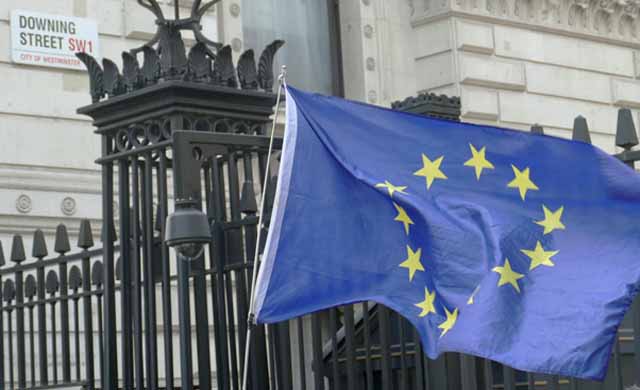A comprehensive look at the effect of Brexit and its impact on dollars to pounds and more

Author: Alexey Gulyi Chief Analyst at EverFX
Following the global financial crash of 2007-2008, many people lost their trust in financial institutions. Others were inspired to do their own research, which has seen many people get into small-scale stock market investment. The worldwide coronavirus epidemic has rattled many countries’ economies. In the UK this could not have come at a worse time, as the prospect of a no-deal hard Brexit looms ever closer.
The whole Brexit scenario has shaken up the country’s economy. Immediately following the vote result being announced, the value of the pound against the euro plummeted. Since then, the previously stable pound has been very volatile, responding to daily events with upward swings or downward plunges.
For example, the announcement of the referendum result in June 2016 caused the pound to drop several percent. Announcements of various guarantees and red lines saw a recovery, which proved to be fragile when those guarantees were not upheld, or the various deals were not accepted. (Newspapers have been unkind to Theresa May for her part in the Brexit scenario: history will almost certainly be kinder when she valiant efforts, and the issues she faced, are properly understood with benefit of hindsight, despite her poorly timed general election.) Boris Johnson’s election in December 2019 caused a rally to the pound, but this also proved disappointing when his ‘oven-ready’ Brexit deal turned out to be less than desirable.
This newfound volatility is unlikely to vanish without a firm and fixed Brexit deal, solid trade partnerships, and strong mastery (on a global scale) of the coronavirus pandemic.
Pound prediction after Brexit
Based on what we know about the behavior of currency there are two scenarios that might play out.
Negative: In the event of a poorly anticipated no-deal Brexit, the pound will fall again. At its worst, during the global crisis in 2008, the pound fell as low as €1.02 to the pound, which is close to parity. In the event of the country being in a poor economic position due to the coronavirus, and having no deals in place with countries outside the European Union, a hard Brexit will most likely see the pound dip below parity with the euro. The economy will suffer as a result, and recovery will be a tremendous struggle, with the UK’s goods and services up for easy grabs by anyone prepared to make a deal.
Positive: Should a good deal be achieved, either with the EU or with strong countries (or blocs of countries) outside the European group, the economy will readily rally, showing strength against both the euro and the US dollar. A strong pound will attract investors, who will be prepared to pay good premiums to be included in investment opportunities and the future, while still requiring sustained effort, will be much brighter for the economy and the population as a whole.
Which scenario will play out is still unknown: the world has never before faced exactly such a situation.
Value of the pound since Brexit
The pound’s behavior, as mentioned above has changed from being relatively strong and stable, moving slightly in response to world affairs, but basically being supported by a strong economy, itself shored up by the power of a 28-country-strong partnership with the EU. This kept the average value of the pound relatively high.
Brexit has made the pound a much more responsive currency (not always an ideal trait) and it has moved fluidly since then against all the major currencies, ending up lower in almost all cases. The USD to GBP is a little different, with the USA going through its own worrisome period and losing much of its financial credibility with the rest of the world. This is, of course, due to unexpected president, Donald Trump’s, ‘America First’ protectionist attitudes, lack of understanding of economic quid pro quos and readiness to rush in where highly trained economists would fear to tread. The dollars to pounds performance against the dollar has, after a jump of about one-third of a percent following the Brexit vote, been largely steady, with slow movements upward or downward, but always within a range of ten cents’ (about 8 pence) or so.
Considered against the G10 economies, the pound has recently had some positive showings, performing ‘the best’ of all ten – but this is a narrow view and ignores the previous four years’ statistics when the pound was trailing the rear by quite a margin. The pounds’ catching up is not due to the excellent performance by the country’s economy – rather, it is because the COVID-19 crisis has flattened the growth in other countries.
Pound to euro before and after Brexit
Considering the relationship of the pound to the euro is a good way to see the overall changes to the pound already caused by those who voted to leave the EU.
The all-time highs and low of the euro to the pound are, respectively 1.752 (achieved in May 2000) and 1.02, during the global financial crisis as mentioned above (in December 2008).
In contrast, just before the Brexit referendum, the euro was sitting comfortably at around €1.32 to the pound – this plunged to €1.10 the day the result was announced. And with some dramatic ups and downs, this is the position that the euro has maintained against the pound since then.
Will the pound rise after Brexit?
It may do. However, a string of fairly unlikely and unrealistic occurrences must happen for this to be anything like a certainty.
First of all, a good Brexit deal must be agreed by all parties before the end of the transition period which runs out in January 2021. This is unlikely given that that UK’s demands are nowhere near the concessions that the EU is prepared to make. Other considerations are interfering with the process too: the Irish border question alone might be enough to completely derail the process.
Failing that, good deals must be put into place with countries outside the EU, who will have to reassure the EU and their other existing partners that these new deals will not cost them anything. This is likely to be a lengthy, delicate and diplomatic process – one that should have begun in 2016 to be assured of readiness in the event of a no-deal Brexit!
Finally, the unexpected spanner in the works that is coronavirus needs to be taken into account, with health and safety measures, travel bans and air-corridors, the additional costs of PPE, and more all sure to impact the world economies in one way or another.
If the EU makes poor decisions regarding trade, medical agreements, and foreign aid, it is possible that by comparison, the pound will do well. But the EU tends to make the most of the many and varied experts that live within its borders, so this is unlikely to happen.
What was the effect of the pound drop after Brexit?
The pound falling against the euro had an immediate impact on expat Brits living in the EU. This is especially the case if they are living on GBP investments and savings, converting as much as they need when their funds run low. In the days following the announcement of the referendum result, they would have received an average of 20c less per pound than they would have done before the vote.
However, companies canny enough to set up deals in which they get paid in euros were immediately better off. Export companies made the equivalent of an extra 6 percent profit on their deals, thanks to the comparatively strengthened euro: and some import/ export companies did exactly this, taking the additional revenue as a welcome addition to their coffers.
For much of the population of the UK, the pound drop had only a negligible effect. Food prices rose slightly, but food prices to tend to fluctuate seasonally anyway. The changes to the cost of living were subtle enough that most people have not noticed them as yet. The cost of holiday money rose slightly, in line with the weakening of the pound, but again, only enough to make a cheap holiday slightly less cheap, rather than transforming it into a costly extravagance.
The Bank of England is very conscious of the effects of any kind of Brexit and has been working to keep the economy as healthy and stable as possible. Interest rates have been cut to the bone, which is good news for mortgage holders and other borrowers
However, all these effects will almost certainly be worsened should the UK leave without a deal.
Hard Brexit: effect on the pound
Should the UK leave the EU without a deal Brexit could prove an almost instantaneous disaster.
For Brits living abroad, their pound-based income will be reduced. For companies importing goods from abroad, whether in or out of the euro-zone, cost prices will rise. While those in the export business will do well, assuming they can find steady customers, almost every other aspect of life will get more expensive – and this time the population will notice it.
In short, anyone converting dollars to pounds will get a better deal than previously, while deals going the other way (from British pounds to any other currency) will be worse.
However, a canny investor can mitigate the effects of a hard Brexit by choosing which currencies to invest in. Finding a reliable currency converter and keeping it to hand when calculating any kind of foreign exchange trade deal, whether it is to buy travel money in a preferred currency, to send money using an international money transfer or simply finding out whether it is better to use a credit card or cash while traveling, is highly recommended.
For those looking for investment opportunities on the back of Brexit, many customers recommend TorFX, thanks to the wealth of flexible investment options, easy to use platforms, and more. If you would like to be able to say ‘We have TorFX as our preferred investment platform,’ too, why not explore some of the great trades made available by an impending Brexit?


 Hot Features
Hot Features












